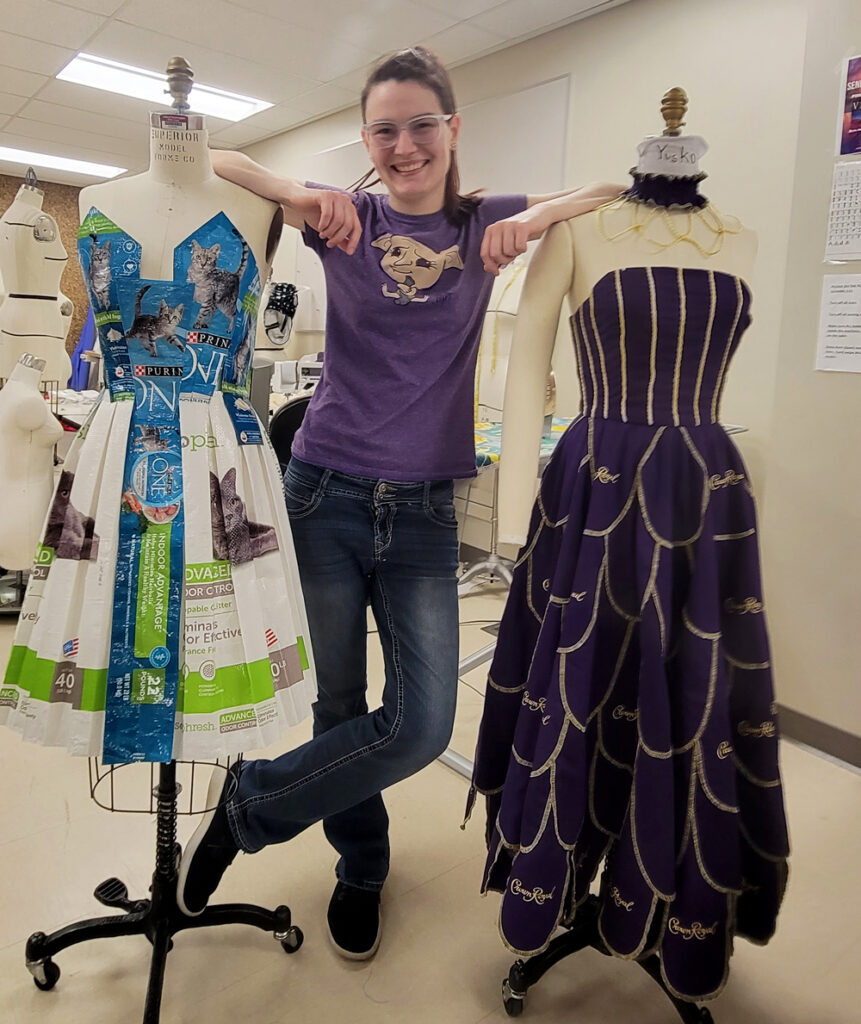YAKIMA, Wash. — Purple felt Crown Royal sacks and plastic kitty litter bags: now on the cutting edge of fashion. Well, “trashion.”
Juliann Yusko is one of several Washington State University students who used post-consumer waste to design and make clothing and apparel that will be shown next week at the Washington State Recycling Association’s (WSRA) annual conference in Yakima.
Yusko, an apparel design major, made a dress from discarded Crown Royal sacks as part of an independent study course. The dress was featured in the annual WSU AMDT Fashion Show earlier this spring. She also made a dress from kitty litter bags during the independent study for the WSRA conference’s Trashion Show.
“I’ve had the idea for the cat litter dress for several years,” said Yusko, a senior planning to graduate in December. “I always try to re-use the bags however I can, and now I have a project for the ones I saved.”
The WSRA contacted WSU’s Department of Apparel, Merchandising, Design, and Textiles (AMDT) once they decided to re-start the Trashion Show after a several-year hiatus. WSRA hadn’t worked with WSU before; they previously put a call out for volunteers to help run the show. This year, organizers contacted AMDT faculty after a quick internet search showed WSU’s interest in sustainable apparel.
“We’re so excited that the students are working on these designs,” said Jenna Burchell, a community relations manager for DTG Recycle in Bothell, Washington,and member of the WSRA conference planning committee. “Combining fashion with upcycled items is a fun way to divert them from landfills and it provides students with a creative project they can hopefully use in their classes and portfolios.”
The fashions come from two general categories: those designed and made previously for this show or other projects, like Yusko’s contributions, and creations by students in AMDT 212: Apparel Product Development, a course taught last semester by AMDT Assistant Professor Armine Ghalachyan.
“We made this the final project for the course, which looked at all manner of waste, such as typically wasted materials, and how those materials affect the environment and human life,” Ghalachyan said. “Then they worked either in small groups or individually to design and create different apparel.”
Students collected and used a wide variety of products, including cables and wiring from old electronics, aluminum tabs from soda cans, plastic grocery bags, and cardboard, Ghalachyan said.
“Some students contacted WSU Waste Management, who gave them access to their bins,” she said. “The students who went there were astonished by how many discarded materials they saw. We want students to think about waste and pollution in a wider sense, to think deeper, beyond apparel and design. Everything is interrelated.”
Three WSU students — two who live in Yakima and Yusko — will attend the Trashion Show in person on May 23. WSRA is providing the students and Ghalachyan with tickets to the conference dinner gala that follows the show.
Conference attendees will serve as runway models for the show, with the three students and Ghalachyan fitting, dressing, and preparing them to step onto the runway. The students may also be modeling the fashions themselves.
“This is a great way to show how much waste society produces,” said Yusko, who hopes to make a career in costume design. “I really appreciate the invitation to work with the conference; it’s fantastic to bring different groups with different interests together. Sustainability is a huge focus in the fashion industry, so looking at non-traditional materials to upcycle makes you think differently and creatively.”
While Yusko will bring her two dresses to the show, not everyone made a full outfit. Some groups in the class, for example, made bags or other accessories. Overall, WSU students created approximately 15 complete looks for the show.
“Most of the students in this class aren’t design students,” Ghalachyan said. “Fun and creativity are more important than function for this project. But it can open up their minds to thinking about what can be done with all this waste.”





